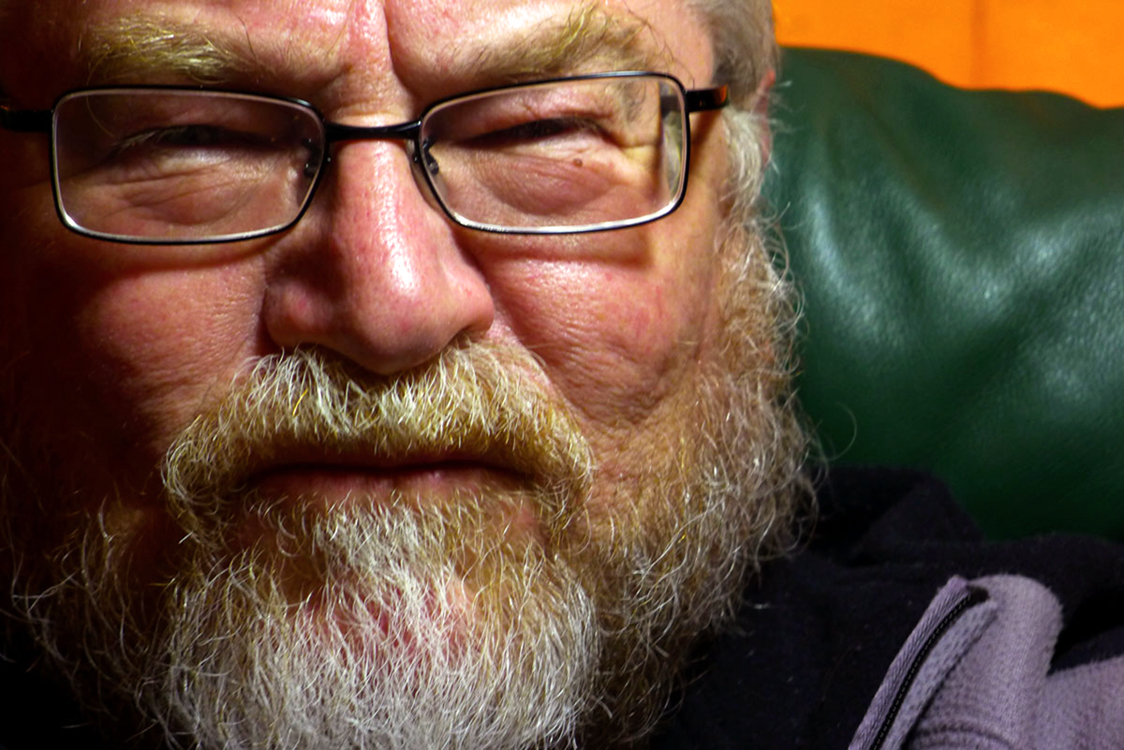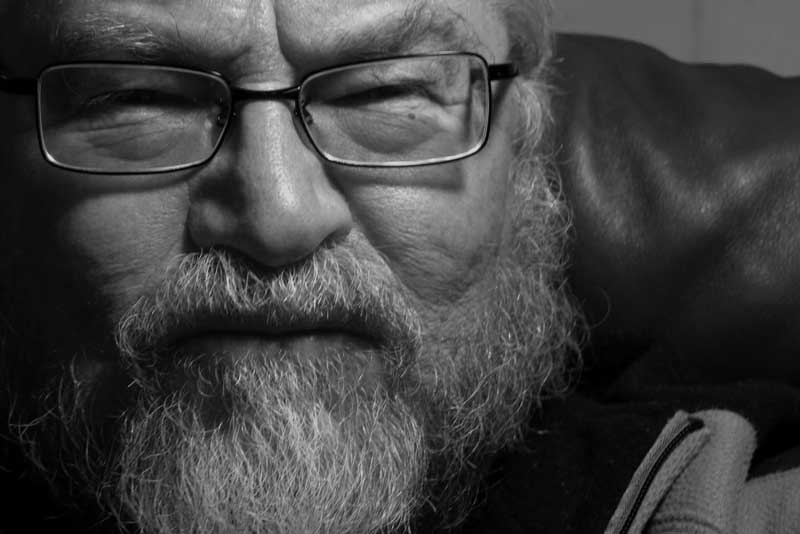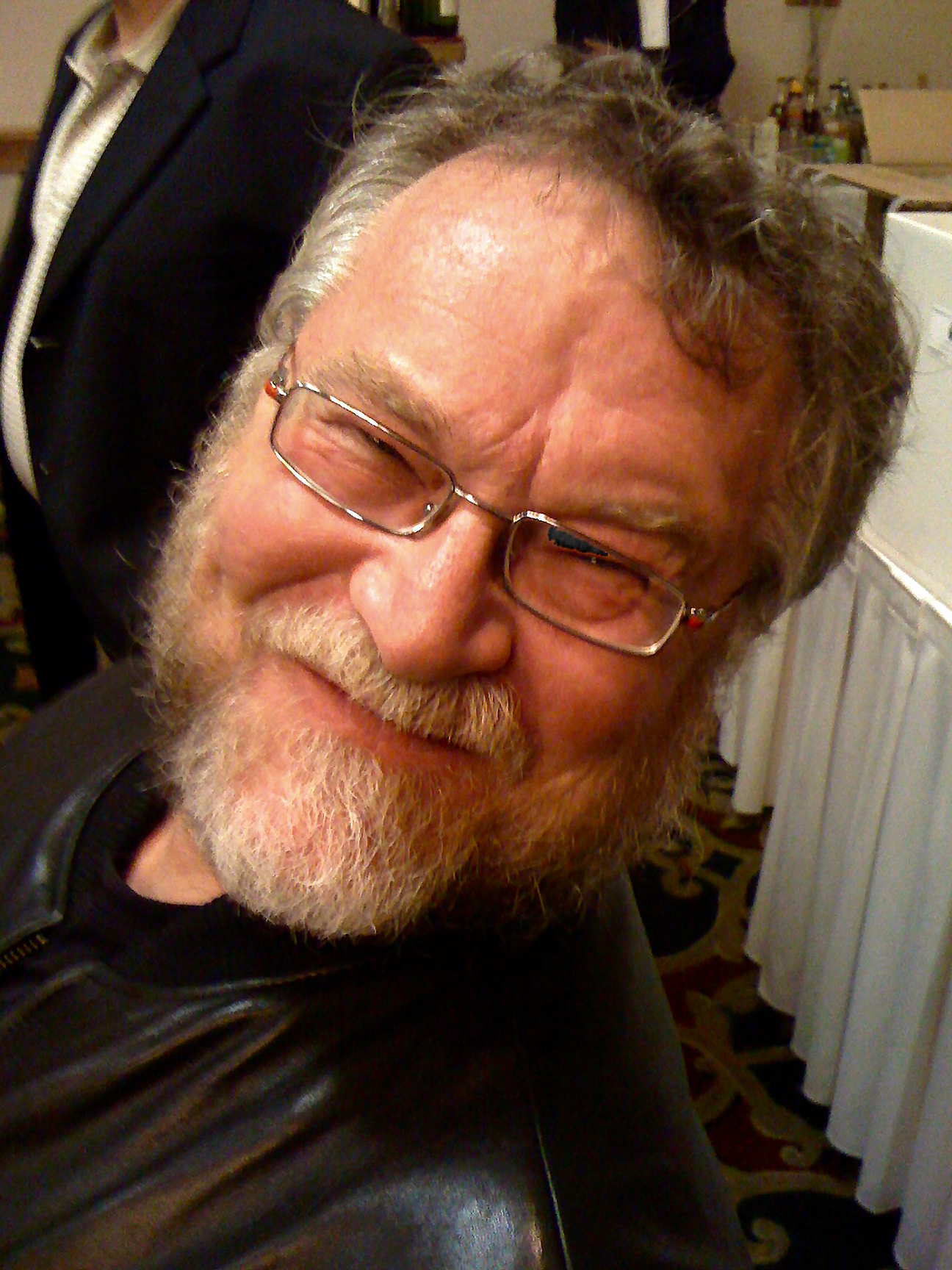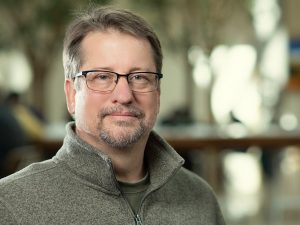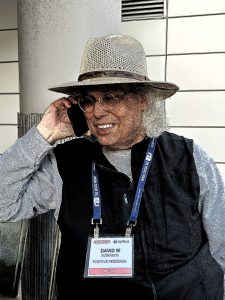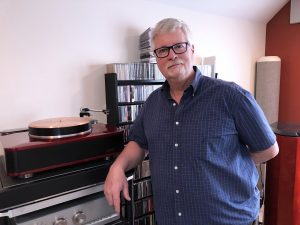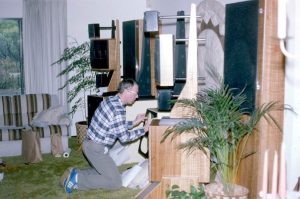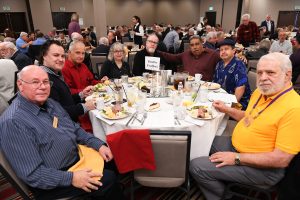Walter Benjamin pointed out, during the tragic era when Adolph Garbage-bag stormed Europe with unquenched anti-Semitic malice, that each memorable character type and archetypal personality reflected (with inevitable prismatic distortion) the underlying zeitgeist from which it emerged on the historical scene. Benjamin suffered inordinately from The Fascist Fraud's hateful pomposity. His philosophically refined awareness of figural enrichment and surprise derived from long and nuanced appreciation of Goethe, Dante, Shakespeare, Marx, Nietzsche, and Karl Kraus.
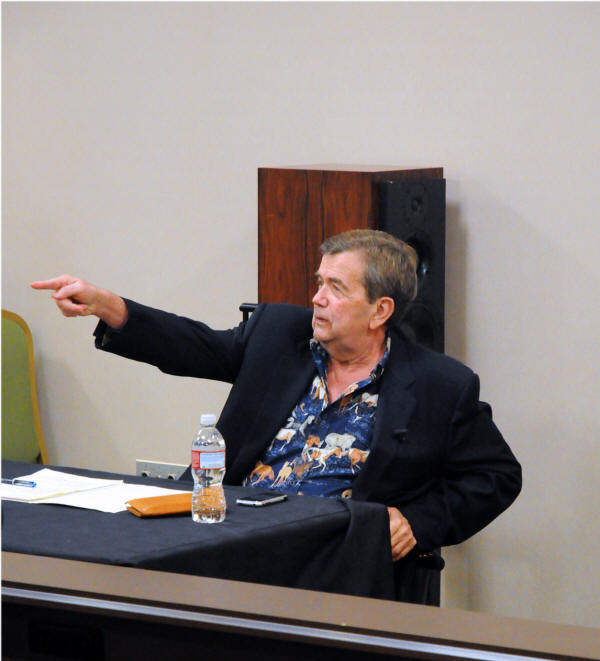
Harry Pearson at RMAF 2009 [Photograph by David W. Robinson]
Consider another pantheon, less astounding, of world class adventurers with more than a dollop of moxie about things audio-related, musically enabled with joyously jocose sonic jouissance. The French have it right: vino, viva la femmes, accordions at night, and let-it-all-hang-out. Consider this note modest homage to a soldier who refused to be defeated.
Like countless others, I came upon Harry's exhortations inadvertently, hardly looking for ex cathedra audio judgments or final words of any sort. I "got" what engaging recorded sound offered. I grew up in the heady days of analogue recording when recording engineers and musicians were on the same team, without egos and rivalries. Columbia six-eye vinyl and Mercury three mic on location recordings defined a musical aesthetic without equal. RCA shaded dog pressings were plentiful and Lester Koenig, in Los Angeles, was making astonishing live recordings as Reice Hamel, Sr. traveled the USA and Canada to memorialize Sarah Vaughan, Bill Evans, Joe Williams, Barbara Streisand, and Count Basie at their most intimate and vivid. All of that was in motion as I spent the bulk of my high school years, and beyond, listening to remote masterpieces by Ahmad Jamal "live" at the Pershing Lounge in Chicago, Ramsey Lewis at Peacock Alley in St. Louis, Duke Ellington's unequaled orchestra on stage in Newport, Rhode Island, and Bill Evans' classic trio captured on a lazy Sunday in New York at the Village Vanguard.
When I got to Princeton, Manhattan was my weekend haunt. I heard so much live jazz over such long years of close attention that I did not believe I needed another set of ears or someone's inevitably divergent taste in sound and music to disabuse and educate the scurrilous rancor of youth's roiling abandon to the lyrical intensity of John Coltrane and Dizzy Gillespie. Who would? (Did you?)
Audio gear was whatever one cobbled together from an amp and preamp, along with lamp cord speaker cables and something that resembled monitors. Even at Princeton, with plenty of leisure capital to snag expensive audio equipment, I never encountered anything that suggested Hi-Fi in any seriously sophisticated way. As kids devoted to rock, most of my acquaintances judged gear by how loud it cranked out Elvis or Chuck Berry. Audiophiledom was two decades away, in a future that a serious music lover had to retreat back to, since longstanding habits die slowly or not at all.
I cannot say that Harry Pearson was the first or most significant audio potentate I lent attention, but his name circulated in listening sessions at Stanford and Cornell with eerie frequency. J. Gordon Holt and Julian Hirsch caught my glance early on, but eventually Harry seemed to pop up everywhere. I remember wondering what sort of fellow had such unflappable confidence that he could bloze on and on about stereo gear without the slightest indication of uncertainty, ambivalence or nuanced analytic and speculative discernment. I found out many years later.
Over decades, following my initial glimpse of the don's graceful Mafioso hammer, I came to both admire and scoff at his rhetorical cavorting. That somewhat dazed double vision doubtless emulated Harry's reluctance to admit anything resembling a peripheral gaze in his estimation of gear. On my part, it was a stubborn commitment to take personal evaluations, in the absence of anything close to "objective" scrutiny, with a bag of salt nearby. If there was a "standard" in play as I pursued his articles, it seemed like a wall-eyed creep toward audiophile self-appointment. Who could be certain, in the shadow of countless published uber-pronouncements by the Head Guy, that he truly, firmly had a clue? There is a frenzy within any earnest intellect regarding its own authority's unearned chutzpah. HP did nothing to exhume doubt from a reasonable audio plebe.
Like many others, I survived to tell my story without damage (almost). The outcome of such demonic forebears is dangerous, sometimes delusional, but almost never subject to languorous self-effacement. So, thus, it was by unmapped triangulation that I met the self-made Disabling Demon when least suspecting his arrival. The Consumer Electronics Show in Las Vegas once held convivial mysteries for visitors who, sooner than not, careen wildly toward geriatric-hood, remembering (perhaps working hard to forget) oats sown on weekends divided between audio banter during daylight and all that's supposed to stay right there in Nevada after dark. At just one of those mish-mash blurring three-day sprawls of too much everything without enough sleep, my astute pal Greg Weaver (now at The Absolute Sound) pointed out the Man Himself in our vicinity as we parked ourselves at a breakfast buffet. Harry had been a guru of sorts for Greg, whose dedication to audiophile information and wisdom is equaled nowhere. He asked me to take a shot of the two of them before we left for a long day's crawl through equipment-loaded rooms. That moment of incidental camaraderie with El Tutto, his own mild self, was the first of many over the next decade. In a nutshell I wonder how many people Harry invited to his holy inner sanctum at Sea Cliff, since most folks I know in the audio world seem to have been invited at least once. For me, it was without regret that it never occurred—except, near the end. See below.
I came to see Harry's sweetness as a man and his vulnerability as a "famous person." His honored position at the pinnacle of a world he largely created seemed to wear on him as I got to know him and truly enjoy his quirky humor. I experienced his growing weariness over his last five or six years. Who should expect eternal strength in any realm of work, certainly not when that domain is so thoroughly public and open to countless interactions on a steady basis? I sat with Harry many times at audio shows and conferences of various sorts, and listened to his sometimes amused understatement about this piece of gear or that presentation. He was never snarky or mean-spirited, but Harry had genuinely "been there and done it." As the diva noted long ago, the thrill had gone. I truly enjoyed the two occasions we asked to listen by ourselves with the courtesy of a closed door to let us share an audio system's sonic footprint uninterrupted by chatter. Harry always put his disc of Holst's Planets in play. I listened to one of my recordings. We swapped a few observations and headed off to different things. I found him to be remarkably honest and genuinely humble, without a trace of lofty self-consciousness.
Our final time together, longer than any previous occasion, took place at Richard Beers' THE Show in Newport, California. Over the course of two days we darted in and out of rooms typically showcasing high-end gear, but we mostly sat near the bar in the main lobby bantering back and forth with innocent jibes, and I inflated compliments that must've sounded to those in proximity like spoken Egyptian hieroglyphics. El Tutto was a clever verbal jouster. I'll admit that, after a verbal assault or nudge, he could take over an exchange with quick wit and devilish glee. There was a quiet ferocity in his intellect that went for the telling uplift or darting put down, followed by sharp raucous laughter. That wholly enjoyable nonsense continued late into Saturday evening. All the while, Harry's vulnerable, bluffing buffo was surprising and exquisite. Strangely, perhaps, he reminded me in retrospect of a much trimmer Orson Wells at the end of the line. His exuberance carried a floating lightness tinged with almost flirtatious self-deprecation. In those two unexpected days I experienced him relaxing, profoundly, in public. He was relaxed and just plain silly, unguarded as I'd never seen before... and, I suspect, may've seldom been so overt and so indulgently celebrated.
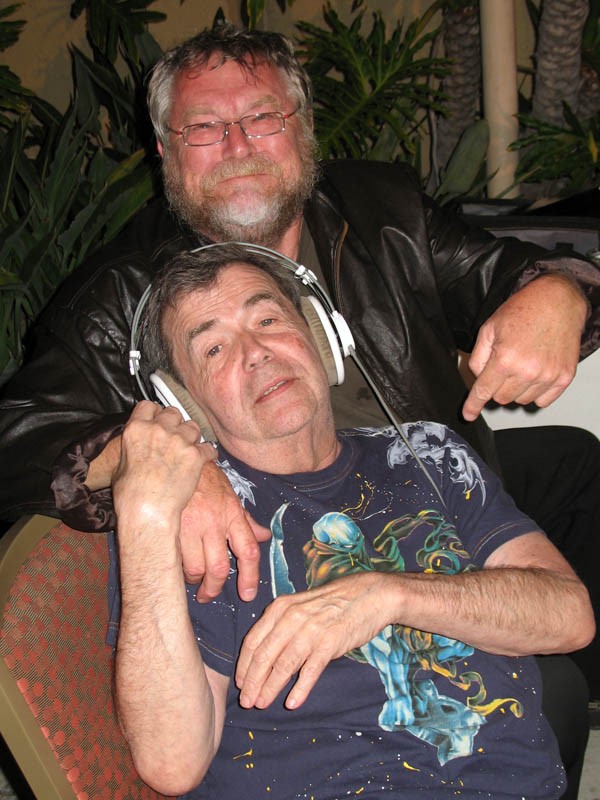
Harry Pearson (foreground) and Jim Merod [Photograph courtesy of Steve McCormack]
Steve McCormack took a snapshot of Harry, plunked (uninvited) on my lap as I was recording Mike Garson on Saturday night at the Newport Show. It was, inelegantly, the last time I saw Harry. He quickly retreated, insisting I must visit Sea Cliff; an invitation, at last.
I cannot say I really "knew" Harry Pearson the way one is more or less close to a dear friend of longstanding. We did not have that acquaintance. But, as I knew him, intermittently, and finally joustingly with high comic humor, he revealed a personal sincerity along with a degree of undefended pathos that moves me as I reflect on his long career.
Harry Pearson set out to be a pioneer of sorts. If not that, then by my imagining, he allowed (and quite probably vigorously enabled) a unique professional persona, not famous in the pantheon of American "stars," nor among those who occupy a niche in the make-believe eternity of cultural evanescence but, rather like one who in lonely reckoning recalls the sounds and magic of another time and place, knowing they were his once in a distant green light all his own.
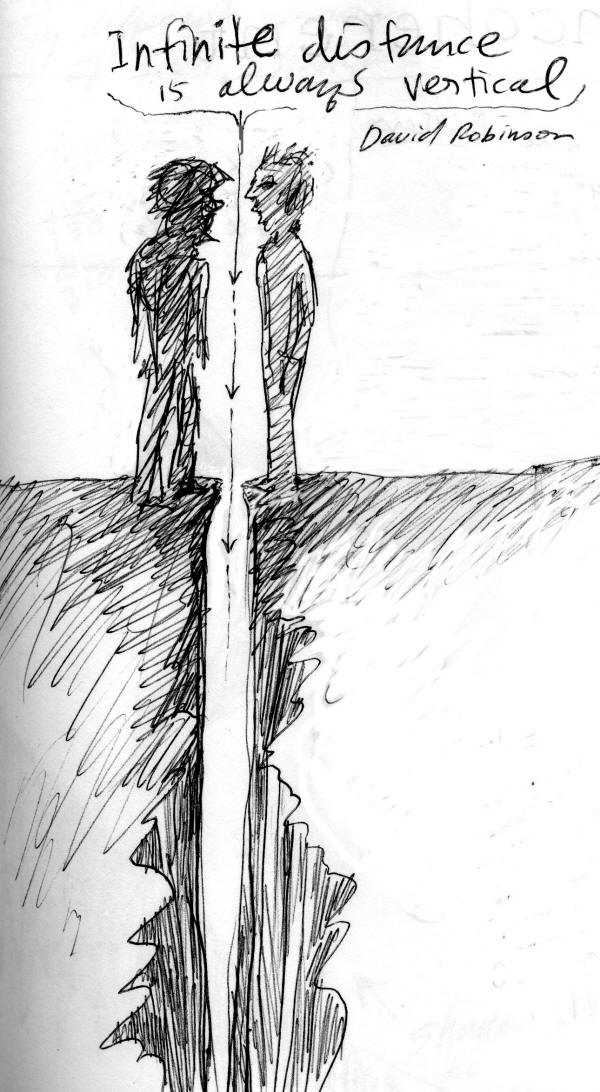
[Drawing by Dan Zimmerman]




